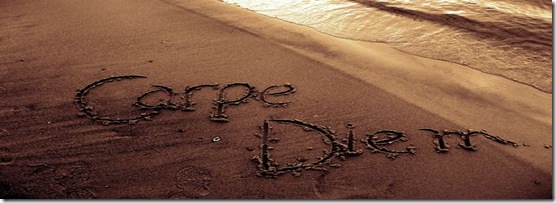Why is “seize the day” our universal motto?
“Seize the day. Live for the moment. Be yourself.” Behind the vitality these maxims exude there is such desperation, so much fear.
05 MARCH 2017 · 19:45 CET

Seize the day. Live for the moment. Be yourself. Only you can be you, only now can be now.
Maxims like these populate my Facebook and Twitter feed like commercials pop on my TV (and platitudes in commencement speeches). They are so inspiring, so life-affirming. We are called to enjoy life to the fullest, to summon our energies and not let a minute pass by. We are admonished to live, to enjoy, to absorb.

You may already sense that part of me is getting annoyed by such maxims. And not only for their virtual omnipresence. Or by how they sound so spring-breakish adolescent. I’m bugged by their hopelessness too. Behind the vitality these maxims exude there is such desperation, so much fear.
How come, if we are being called in a totally positive, harmlessly inoffensive, politically correct way to enjoy the moment however we may define it?
How can “follow your heart” be misguided at all? Because of this. Behind the plethora of carpe diems lies not just an emotional fear but also a philosophical angst that nothing better than the present can be found. We are called to seize the day because we are afraid of the future – and haunted by the past. We isolate the moment as a fragment to be enjoyed in a vast ocean of uncertainty. Who knows whether we’ll have a future.
The roots of this generational motto go deeper than Coca-Cola commercials and Oprah’s be yourself advice. It is the offspring of utter materialism. It is the euphoric side of bipolar nihilism. It is the slogan of unrivaled consumerism. The moment is the orphan of the intellectual destruction of any ideal worth living for. We, at least in the West, have a vague fear that we have deconstructed our past (there’s nothing of interest there) and are reticent of being able to construct anything of value, anything that lasts, anything of real transcendence, anything that will not get deconstructed. The solution? The present! Why worry about the past anyway? Why build anything when we can just enjoy ourselves?
Luc Ferry, in this brilliant A Brief History of Thought, locates this idolization of the present in a postmodern, post-Nietzsche retrieval of Stoic philosophy, after the death of ideologies, faiths and religions.
The doctrine of material salvation actually restores the famous saying of Greek wisdom, carpe diem, (“seize the day”), which is the conviction that only the life located in the here and now … is worth living…. [When] we liberate ourselves from the heaviness of the past and the future, we reach serenity and eternity, here and now, because there isn’t anything else; there isn’t any reference to ‘possibilities’ which relativize present existence and instill in us the poison of doubt, of remorse or of hope. [1]
The call to seize the moment, in other words, is the desperate imperative of despondent materialism. Behind it’s life-affirming smile lies actually quite a dark view of reality. There isn’t any form of transcendence or redemption: hence, enjoy your stuff. Nietzsche has defined hope “the evil of all evils”; André Comte-Sponville declared that “To hope means desire without enjoyment, knowledge or power.” [2] No wonder we are summoned to enjoy the present, because not much else is left.
Sorry that I gotta go (the moment is eluding even me here…) But if you really want to seize this moment, here and here you’ll find the reason I believe a wonderful redeeming future is just around the corner.
René Breuel is a pastor in Rome. He is editor of Wondering Fair.
[1] Luc Ferry, Vivere con Filosofia [A Brief History of Thought] (Milan: Garzanti, 2007), 184-185, 210-211.
[2] Quoted in Ibid., 210.
Published in: Evangelical Focus - Culture Making - Why is “seize the day” our universal motto?
